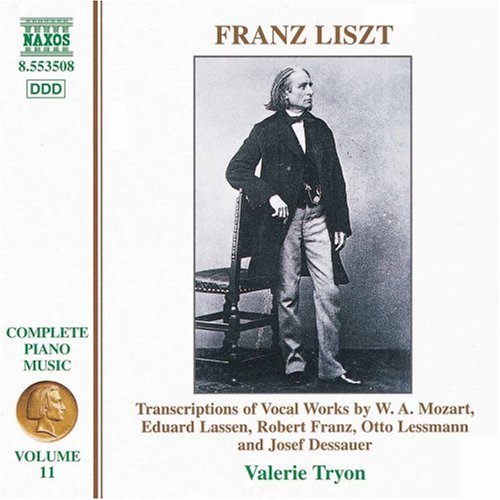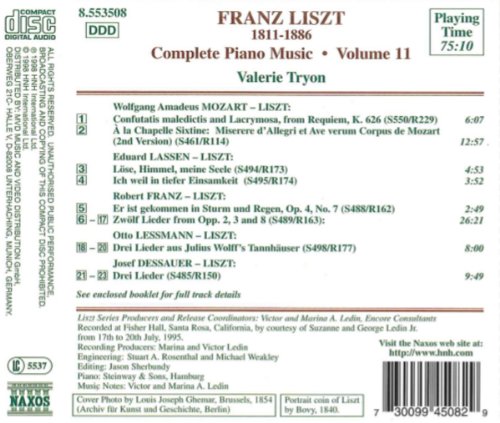Disco de Franz Liszt: «Complete Piano Music 11»

- Título:Complete Piano Music 11
- Fecha de publicación:1998-08-25
- Tipo:Audio CD
- Sello discográfico:Naxos
- UPC:730099450829
- 1Requiem, K. 626: Confutatis maledictis And Lacrymosa
- 2Ave verum corpus: A la Chapelle Sixtine: Miserere d'Allegri et Ave verum Corpus de Mozart (2nd Version)
- 3Lose, Himmel, meine Seele
- 4Ich weil in tiefer Einsamkeit
- 5Er ist gekommen in Sturm und Regen, Op. 4, No. 7
- 6Auf geheimen Waldespfaden, Op. 2, No. 1
- 7Druben geht die Sonnescheiden, Op. 2, No. 2
- 8Trube wird's, Op. 2, No. 3
- 9Sonnenuntergang, Op. 2, No. 4
- 10Auf dem Teich, Op. 2, No. 5
- 11Der Schalk, Op. 3, No. 1
- 12Meerestille, Op. 8, No. 2
- 13Der Bote, Op. 8, No. 1
- 14Treibt der Sommer seinen Rosen, Op. 8, No. 5
- 15Gewitternacht, Op. 8, No.6
- 16Das ist ein Brausen und Heulen, Op. 8, No. 4
- 17Fruhling und Liebe, Op. 3, No. 3
- 18Tannhauser: Der Lenz ist gekommen
- 19Tannhauser: Trinklied
- 20Tannhauser: Du schaust mich an
- 21Lockung
- 22Zwei Wege
- 23Spanisches Lied
Volume 11 in Naxos' Complete Piano Music of Liszt series is another outstanding contribution to the Liszt discography. Previously, Lisztophiles could only enjoy these particular transcriptions through the expensive Hyperion label recordings with Leslie Howard. This Naxos release is therefore a much-appreciated alternative; for some of the pieces, this recording is *the* alternative. While there are two masterworks featured here (the Mozart transcriptions), the other vocal arrangements are collectively not enough to garner this recording a complete full five star rating in my opinion. There are essentially a few gold nuggets and plenty of stones in this quarry of transcriptions. Nevertheless, Valerie Tryon brings clarity and expressivity to these works, often surpassing Leslie Howard with her quality of execution.
Liszt's piano transcriptions of Mozart's "Confutatis" and "Lacrymosa" from the Requiem date from 1865 and shine as true models of the art of piano transcription. Liszt expertly assimilates the vocal lines into a thick texture that, to my ears, matches the power of the original orchestral/vocal score. "A la Chapelle Sixtine" is perhaps Liszt's finest homage because it glorifies two composers who shared an interesting connection: Gregorio Allegri (1582-1652) and Mozart. Many are familiar with the legendary story of a young Mozart hearing Allegri's 'Miserere mei Deus' twice and transcribing it faithfully from memory. Liszt's work presents a colossal tapestry of profound, haunting and virtuosic variations on Allegri's "Miserere." Liszt's transcription calls for heavy funereal playing in the bass and Tryon's powerful interpretation is astonishing; the music resonates gravely and sends shivers down the spine. These variations are capped off by a sublime transcription of Mozart's "Ave Verum Corpus," one of his last works that exudes an otherworldly beauty. Valerie Tryon's performance is stormy, achingly beautiful, and far more effective than Howard's opaque recording of it.
Liszt's song transcriptions may appear disparate and sometimes puzzling. While the Schubert and Mendelssohn transcriptions are precious, his selections of songs by Lassen, Franz, Lessmann, and Dessauer are odd. It's important to understand that Liszt generously transcribed their works for the purpose of popularizing their music. Overall, most of these songs are attractive and some are commendable, but others fall short. Lassen's two songs, for instance, make for exciting and melodious piano music, but Lessman's and Dessauer's specimens are mediocre (to be fair, Dessaur's "Spanisches Lied" is charming). Robert Franz's compositions deserve more recognition and Liszt showcases his music well. "Drüben geht die Sonne scheiden" (Yonder is the Sun Departing) and "Trübe wird's" (Dark the Sky) are gems with exquisite music material. "Gewitternacht" (Stormy Night) and "Das ist ein Brausen und Heulen" (Tempest and Storm-Furies Shrieking) are also superb evocations and Tryon plays them with verve and lyricism. Although there are others worth listening to, most of these are ultimately just decent Romantic miniatures that might not encourage repeated hearings.
Bottom line: This is unfortunately one of those CD's with a couple great works and many ordinary ones. The song transcriptions will appeal to those with an affinity for Romantic miniatures, but Liszt's Mozart transcriptions and his variations on Allegri's "Miserere" are masterpieces that need to be heard. Valerie Tryon gives spirited performances and pronounces the "A la Chapelle Sixtine" with intensity, radiance, and manic virtuosity.


